March 4th - the First Major Political Quake in EU in 2018
Adelina Marini, March 3, 2018
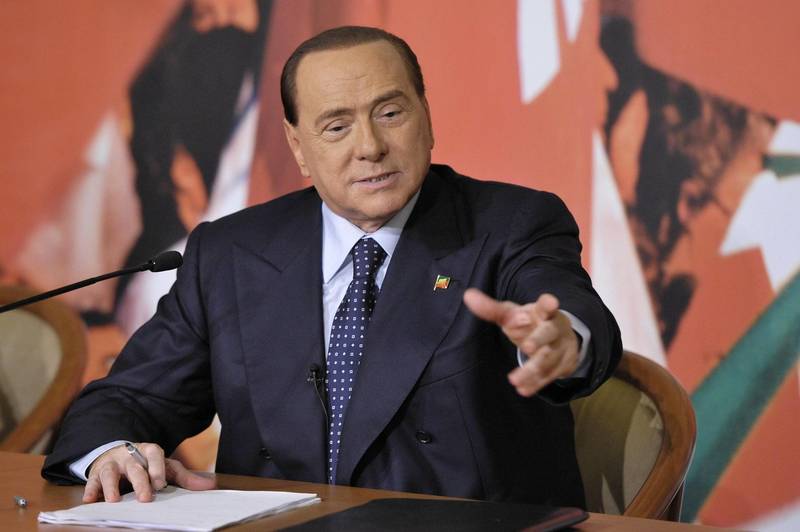 While the Bulgarians will be getting sober on 4 March after the March 3 celebrations of Independence Day - some celebrating that Putin did not comet this time round and others that, after all, the holiday was honoured by his spiritual hand, Patriarch Kirill, amid the Bulgarian EU Council Presidency, in Europe a major quake could happen. There are two epicentres - Germany and Italy. In Germany, on March 4th, Angela Merkel's coalition is to be tested for the last time - the Social Democrats will vote whether to support it. It is not impossible that they vote against it, which means a continuous period of uncertainty in the country, which has held in its hands the stability of the entire European Union, but especially the euro area.
While the Bulgarians will be getting sober on 4 March after the March 3 celebrations of Independence Day - some celebrating that Putin did not comet this time round and others that, after all, the holiday was honoured by his spiritual hand, Patriarch Kirill, amid the Bulgarian EU Council Presidency, in Europe a major quake could happen. There are two epicentres - Germany and Italy. In Germany, on March 4th, Angela Merkel's coalition is to be tested for the last time - the Social Democrats will vote whether to support it. It is not impossible that they vote against it, which means a continuous period of uncertainty in the country, which has held in its hands the stability of the entire European Union, but especially the euro area.
This would also mean that all plans for Europe's future will be thrown again in the freezer awaiting better times. But this will hardly be soon because the momentum for more integration came from a once-in-a-life-time event - Brexit. Moreover, before the deepening of European integration, and especially in the eurozone, there are still major roadblocks. Therefore, we come to the second epicentre - Italy - where there has been a nationalist-fascist-populist competition "Who is the best anti-migrant", which will probably end with great uncertainty. The only certain thing is that there will be no reforms any time soon in a country that is home to the second largest public debt after Greece.
In November, when the European Commission presented the autumn package of the European semester, it expressed concern with Italy's persistently high public debt. The forecast is that this year it will be 130.8% of gross domestic product, which is a mild reduction compared to 2016 when it reached 132.0% of GDP. In a letter to the Italian finance minister, Pier Carlo Padoan, Commission Vice President Valdis Dombrovskis (Latvia, EPP), who is responsible for the euro, and economic affairs Commissioner Pierre Moscovici (France, S&D) warned that even this forecast for 130.8% is not stable because Italy's economic growth is worse than expected, privatisation revenues are lower, and there are still huge debt arrears in the administration.
"Such high public debt constraints the government's room for manoeuvre for more productive investment for the benefit of it citizens. Given the size of the Italian economy, it is a source of common concern for the euro area as a whole".
Italy is among the five euro area countries for which the Commission sees a risk of non-compliance with the Stability and Growth Pact fiscal rules. That is why, the Commission decided to reassess this spring the Italian efforts to reduce debt. However, this assessment will hardly be any clearer because, during the campaign for the parliamentary elections, a lot of promises were made which, if implemented, will have severe consequences for the Italian budget and therefore for the public debt. Italy, though, is doing very well in the fight against non-performing loans. This is one of the most important conditions to complete the banking union and to unlock the next level of integration in the eurozone.
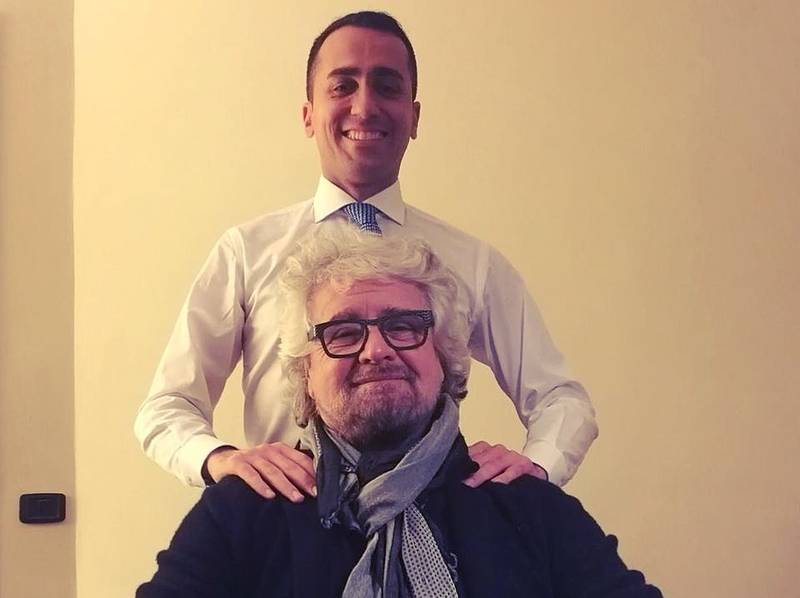 European Central Bank's data from January show that the quantity of NPLs in the Italian banking system has dropped by 24.6% in the second half of 2917. Only Slovenia did better by registering a 30.4% reduction. The piling up of NPLs during the euro area crisis caused a series of crises in the Italian banking sector which forced the Commission to allow Italy not to act according to banking union rules but to bail some of the banks out. Nevertheless, the level of NPLs is still high which hampers the building of the banking union's third pillar - the common deposit insurance scheme.
European Central Bank's data from January show that the quantity of NPLs in the Italian banking system has dropped by 24.6% in the second half of 2917. Only Slovenia did better by registering a 30.4% reduction. The piling up of NPLs during the euro area crisis caused a series of crises in the Italian banking sector which forced the Commission to allow Italy not to act according to banking union rules but to bail some of the banks out. Nevertheless, the level of NPLs is still high which hampers the building of the banking union's third pillar - the common deposit insurance scheme.
Until recently, the biggest obstacle was Germany which insisted risks in the banking system to be reduced first, one of then is precisely the NPLs, and only then to move toward risk-sharing. In the beginning of the year, however, Berlin signalled that it is ready to compromise because of the good dynamics of clearing of NPLs from the banks' balance sheets. However, if on March 4th, the Social Democrats stand on the way of Angela Merkel's fourth government, this window of opportunity will close for an unknown period of time.
Another roadblock before the deepening of euro area integration is the respect of fiscal rules. This is the most important condition to move toward creating a common euro area budget which will, at first, be aimed at ensuring protection in case of asymmetric shocks like those that happened during the euro area debt crisis, and will be used mainly to keep the level of investments and to protect against an unemployment rise. All this, however, requires a very high level of trust among the member countries, but Italy's future government might not be able to be a credible partner in this regard.
From anti-EU to pro-EU
Mainly populist, nationalist and even reborn fascists are fighting for power in Italy. Elections in this southern country are an ebullient mixture of all problems Europe clashed with in the past years - the euro area crisis, migration, euroscepticism (however, incepted by the first two), populism, illiberalism, geopolitical disorientation. Whatever the outcome on Sunday, Italy will wake up on Monday deeply hurt, divided and with fractured democracy, it will again be a millstone around euro area's neck, its stability and future.
In the peak of the euro area debt crisis, the member states were falling one after another like a domino. When the fire came to Italy's door everyone realised that if Rome fell this would be the end, simply because Italy is too big to save. This required emergency measures, like a change of the then populist government of Silvio Berlusconi. The worst was avoided but since then Italy's recovery has been slower and less convincing than Greece's, whereas the common ground between the two is that the needed reforms are so deep that they even require a restart of the state and its relationship with the market. As some commentators wrote in the Italian press these days, it is about whether Italy will finally build a market economy or it will continue in the same way.
In the background, all these years, the migration problems have been boiling quietly. Italy has had problems with migrants for years being at the forefront of the EU. Rome has for years begged its peers in the EU to reform the Dublin regulation to ease the burden of front-line states. The internal countries, however, did not want to break their comforts and Germany was among the most vocal proponents of this narrative. In 2015, however, the nerves of the then prime minster of Italy, Matteo Renzi, were over and he threatened to veto every major European decision unless the Italian, and already the Greek, migration problem is resolved. This was when the EU recognised that the migration problem is a European problem.
Merkel's mistake
German Chancellor Angela Merkel decided to show the long-awaited solidarity with the front-line states and temporarily suspended the European regulations without consulting with the other member states. From here on the story is well familiar. The Central European countries, led by the illiberal Viktor Orban, pulled the handbrake on the urgently adopted European legislation for a fair distribution of burden and for finding a durable solution to the problem. Now with hindsight, if Merkel had not made this mistake, this would have hardly changed the situation significantly, and might have even worsened it because talks to find a European solution to the Italian problem would have taken years, and would have hardly had the same scale as now, which would have again left Italy unsatisfied and disappointed.
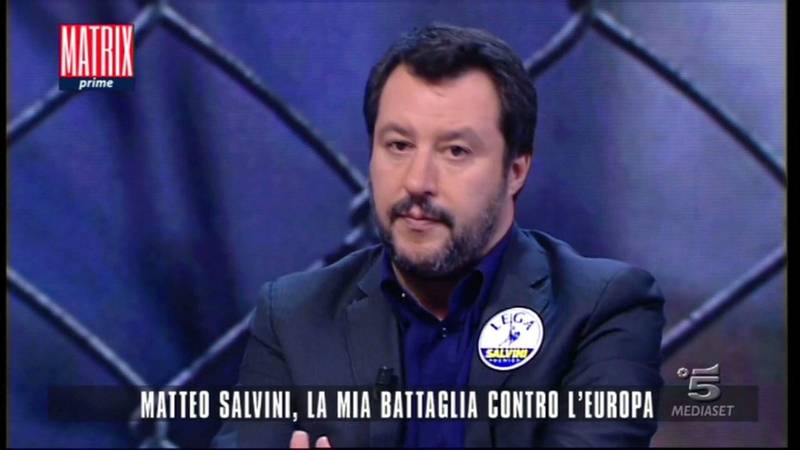 Nevertheless, this divided Europe and created fertile ground for populist and eurosceptic forces across Europe, thus creating a new danger for EU's survival. And the result in Italy is logical - disappointment with Europe's refusal to help (in time) one of the most pro-European member states led to a tangible rise of populist, nationalist, fascist and eurosceptic political forces. All the concessions the Commission made to Italy in the fiscal area did not help.
Nevertheless, this divided Europe and created fertile ground for populist and eurosceptic forces across Europe, thus creating a new danger for EU's survival. And the result in Italy is logical - disappointment with Europe's refusal to help (in time) one of the most pro-European member states led to a tangible rise of populist, nationalist, fascist and eurosceptic political forces. All the concessions the Commission made to Italy in the fiscal area did not help.
The heightened levels of hate speech, xenophobia and fascism left blood stains on the campaign after an Italian nationalist opened fire on refugees in the town of Macerata in the beginning of February. Anti-migration rhetoric was central for the nationalist eurosceptic party Lega Nord, led by Matteo Salvini, who compares himself to Donald Trump. The party participates in a blood-freezing alliance with the reborn Silvio Berlusconi, who opened the campaign with a brand new face after facelifting, new teeth and freshly died hair, and the pro-nazi party Fratelli d'Italia (Brothers of Italy). To see better the scale of the disaster, the leader of the brothers, Giorgia Meloni, met on February 28th with Hungary's Prime Minister Viktor Orban in Budapest.
During the visit, both agreed that migration is Europe's biggest threat, and the Italian Marine Le Pen explained that the V4's ideology has a special place in her party's manifesto, including regarding the "expansionary bureaucracy" of the EU and its attempts to "appropriate power from the nation states". The possibility Lega Nord and Fratelli d'Italia to participate in a coalition government with Silvio Berlusconi is not that little, which could be a big problem for EU's unity, bearing in mind also that almost all parties in Italy are pro-Russian.
Another contester for Italy's governance is the populist Movimento 5 Stelle (Five Star Movement), led by Luigi Di Maio. Against the backdrop of the far right, the movement, established by the comedian Beppe Grillo, does not seem such a threat because it is not that eurosceptic. However, the problem is that it is incoherent and, as any populist formation, changes its position depending on the wind that is currently blowing. The movement is at the moment the biggest political force in Italy but it will hardly secure complete majority, at least not according to the last opinion polls which, however, are not quite reliable in Italy.
The second largest political power on Italian stage are the divided Social Democrats who are at loggerheads with each other but are united in a way by the figure of the incumbent Prime Minister Paolo Gentiloni, who is very much liked by the Italians. A possible government with them would be the most acceptable option for the EU and also for Italy itself, although during the five years they have been in power they failed to implement the necessary reforms. Some of them were launched but remained unfinished, others did not go deep enough, and a third group were left for later. But still, they remain the most preferable option for the EU which is evident by the unequivocal support Gentiloni receives from EU's motor - the Merkron duo. Since last year, France and Germany have been doing their utmost to compensate their earlier refusal to help Italy and the central European resistance.
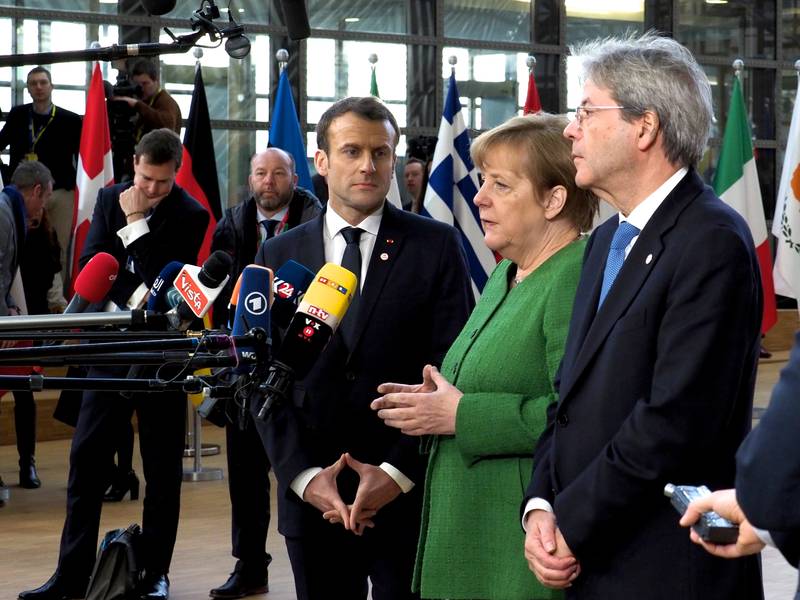 The latest such support was demonstrated during the informal EU summit on February 23rd when French President Emmanuel Macron, German Chancellor Angela Merkel, and Italian Prime Minister Paolo Gentiloni entered together the Council building and conveyed a joint message how important it is the EU to work on European level to resolve the issue with illegal migration in the countries that are a source of such migration in Africa. The trio's appearance before the media can be interpreted also as support for the pro-European forces in Italy. The question is however, is this support coming a little bit too late?
The latest such support was demonstrated during the informal EU summit on February 23rd when French President Emmanuel Macron, German Chancellor Angela Merkel, and Italian Prime Minister Paolo Gentiloni entered together the Council building and conveyed a joint message how important it is the EU to work on European level to resolve the issue with illegal migration in the countries that are a source of such migration in Africa. The trio's appearance before the media can be interpreted also as support for the pro-European forces in Italy. The question is however, is this support coming a little bit too late?
It's not all that bad in Italy, though. For these elections a strongly pro-European force emerged, something Macronian-like. The "More Europe" party (Piu Europa), led by the well known Emma Bonini, is very well accepted. It is hard to say what its performance will be this Sunday, but I will bet on certain if I tell you that Piu Europa will not have a Macron-effect but it might stand in the way of forming a coalition government. The campaign for the 4 March elections showed that the new generation of Italian politicians is coming mainly from the far right, grazie Orban. In the same time, Italy's immune system seems still strong but not sufficiently to lead to the Macron-effect that swept France last year and caused a reformist tsunami across the EU.
In addition, the Italian election is also a litmus test for the European elections in 2019. Their outcome will certainly have a serious impact on the bargaining for the highest European positions which will be vacated next year. If the German Social Democrats prove unable to overcome their party interest this could lead to a new period of instability and uncertainty in the EU. And this could give a new push for the eurosceptics an populists in Europe.
 Angela Merkel, Emmanuel Macron | © Council of the EU
Angela Merkel, Emmanuel Macron | © Council of the EU Benoit Coeure | © Council of the EU
Benoit Coeure | © Council of the EU Pierre Moscovici | © Council of the EU
Pierre Moscovici | © Council of the EU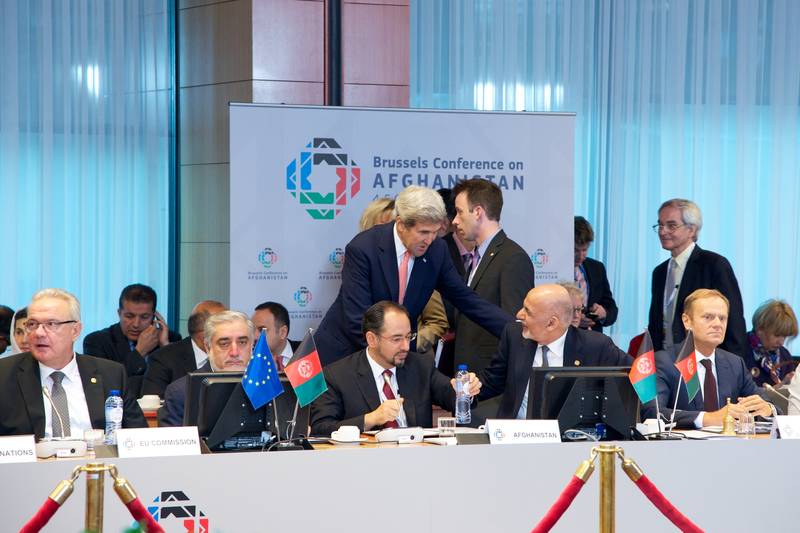 | © Council of the EU
| © Council of the EU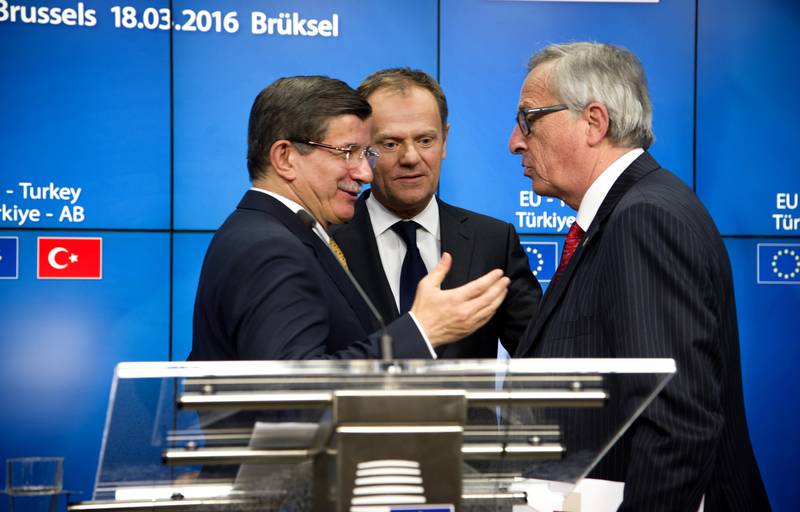 Davutoglu, Tusk, Juncker | © Council of the EU
Davutoglu, Tusk, Juncker | © Council of the EU | © Vlada RS
| © Vlada RS